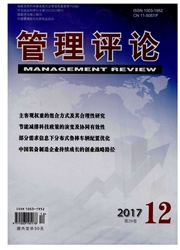

 中文摘要:
中文摘要:
本文以我国西北地区通过质量管理体系认证的324家企业为样本数据,研究质量管理实践与企业不同绩效之间的关系模型,特别关注了创新绩效在其中的地位和作用,并且分析了行业竞争程度、企业发展阶段以及企业规模三项情景因素对于关系模型的调节影响作用。实证结果表明,质量管理实践不仅能够通过质量绩效和运作绩效来改善最终的经营绩效,而且可以借助创新绩效这一中介变量发挥积极的影响作用,但是质量管理实践对于经营绩效的直接作用并不显著。在考虑了情景因素后得出,行业竞争程度对于关系模型的调节作用不显著,而企业发展阶段和企业规模对于模型的关系强度有十分显著的调节影响。研究的意义在于肯定了质量管理活动和创新活动能够协调发展的观点,同时对于质量管理是否属于情景依赖的争论提供了必要的实证依据。
 英文摘要:
英文摘要:
By exemplifying 324 firms in west-north China which have passed certifications of ISO quality management systems,this paper examines the relationships between quality management practices (QMP) and firm performance.The new model emphasizes innovation performance's status and moderating effects of three contextual factors on the above influencing relationships,which are industry competition level,firm development phase and firm scale.The results show that quality management practices can affect business performance not only by improving quality performance and operational performance,but also through the mediate variable namely innovation performance.Another conclusion is that quality management practices do not have positive impact on firms' business performance directly.Furthermore it can be concluded that firm development phase and firm scale will moderate the relationships between quality management practices and firm performance,while industry competition level doesn't.The paper affirms the viewpoint that quality management activities will accord with innovation activities and it provides valuable empirical evidence for the debate whether quality management is context-dependent.
 同期刊论文项目
同期刊论文项目
 同项目期刊论文
同项目期刊论文
 期刊信息
期刊信息
